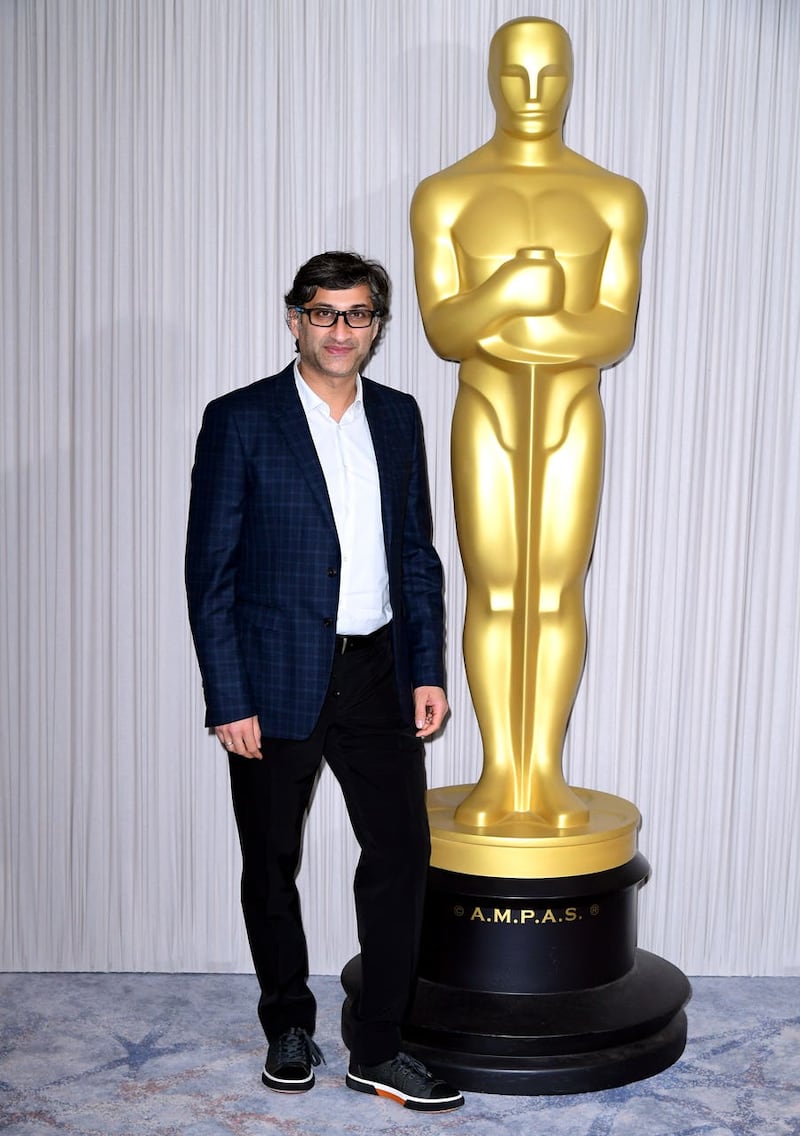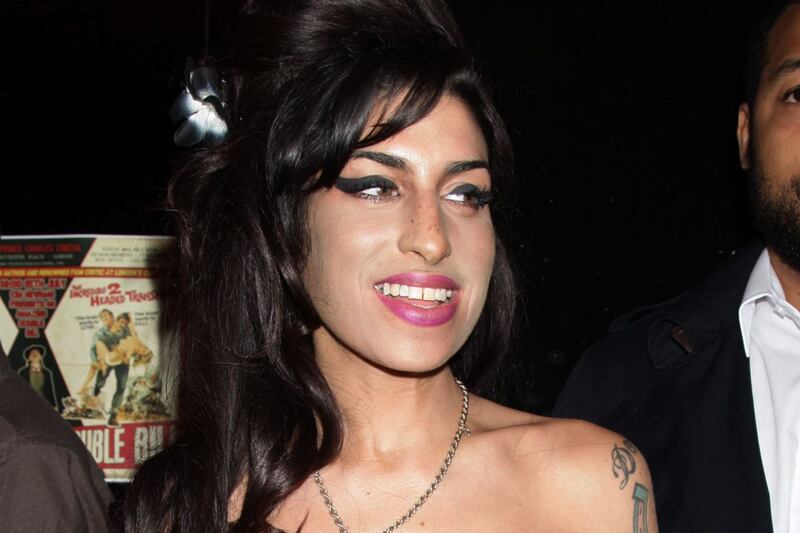“I’VE always tried to do things differently – because my point of view is different,” says Oscar-winner Asif Kapadia of his hugely successful career as a documentary film-maker.
“I don’t come from private school, I don’t come from money. My family were not in the film industry. I’m not white, I’m brown, and my background is Muslim. My family are from India and are quite religious.
“As the youngest of five kids, my parents kind of let me do what I wanted to do. I was able to have a point of view, I wasn’t told, ‘You must do this’: I picked what I wanted to study, I never did A-levels. When I was at university, I would always argue with the tutors, because I would kind of have to do what they told me to do.
“Things like that were me just me going, ‘I don’t feel that’s right, I’m gonna do this’. So I’m quite stubborn, I guess.”

This trait has paid off well for the London-born director – after a fashion. While Kapadia’s latest documentary, Federer: Twelve Final Days, a co-direct with Joe Sabia chronicling the Swiss tennis star’s emotional retirement from the sport in 2022, follows his previous trio of acclaimed bio-docs, Senna (2010), the Amy Winehouse-centred Amy (2015) and Diego Maradona (2019), the film-maker had a tough enough path to success.
Read more:
- Director Asif Kapadia on tackling the real Diego MaradonaOpens in new window
- ‘Who thought this was a good idea?’ - Roisin Agnew on The Ban, her new film on the British government’s anti-Sinn Féin ‘broadcasting ban’ of the 1980s and 90sOpens in new window
- Docs Ireland returns with eclectic selection of factual films including New Lodge-centred The FlatsOpens in new window
Indeed, 23 years ago, Asif Kapadia was a budding feature director, fresh from the Royal College of Art with an unconventional hit debut on his hands: filmed in India with dialogue entirely in Hindi, The Warrior was a Western-informed adventure which landed Kapadia two Baftas, for Best British Film and Most Promising Newcomer.
Sadly, things quickly went wrong for The Warrior when a mooted US distribution deal with Harvey Weinstein’s then all-conquering Miramax went sour. When Kapadia politely declined the now disgraced movie mogul’s stringent exclusivity-based terms, Weinstein then ensured he and The Warrior were effectively blacklisted in the US: the film is still unavailable there to this day.
However, after a period in the low budget indie feature wilderness, Kapadia triumphantly re-surfaced nine years later with his first feature documentary, Senna, another Bafta-winner which found the director fighting a protracted battle with his producers to make the film he wanted.
“Senna was my fourth feature,” Kapadia tells me of his game-changing, mould-breaking account of Brazilian Formula 1 legend Ayrton Senna’s spectacular rise and tragic demise, in which he scrapped the conventional ‘talking heads’-based approach to factual film-making in favour of constructing a hugely cinematic collage of archive content culled from every corner of the globe/internet combined with contemporary audio interviews.
“A lot of people just assume that’s when I started, but I’d done a lot before then – and everything I’d learned before went into the making of Senna.
“Having worked with studios and knowing how you can get treated, it’s important to be across every level in order to follow your vision.
“Then, if it doesn’t work, at least you tried. And if it does work, you can start trusting your gut instinct.
“Because I’d never made docs before, [with Senna] I was like, ‘I think I can do something different’. And that included not putting in talking heads. But then I was away in Sao Paolo doing some interviews, and when I came back I was presented with this edit where all the executives and producers had cut in loads of [talking head] interviews.

“I’m not joking – I felt like crying. I was so upset, because I’d been fighting this battle so long. And I was just like, ‘Really, I will compromise over this, I will compromise over that – but this isn’t the film’.
“And I’m glad I fought back, because I was right.”
When he appears at the Docs Ireland festival in Belfast this weekend for a special ‘in conversation’ event, Kapadia will also be presented with an award for Outstanding Contribution to Documentary.
When asked what advice he’d give to those following in his footsteps, the director – who won an Oscar, Bafta and Grammy with Amy – again comes back to the importance of following your own path – especially if you are an ‘outsider’ like him – along with sheer tenacity.
“I’d say my biggest kind of ‘note’ is that you’ve got to learn to trust your gut,” says the director, who also helmed two episodes of David Fincher’s acclaimed Netflix series, Mindhunter, in 2017, and whose next film, 2073, will combine documentary and drama to explore ‘the biggest challenges endangering our present’.
“A lot of film-making and being an artist is about instinct, and gut. You may not always have the language to explain why, but your point of view is important and unique – and that is what makes you special.
“Your point of view is built from your environment, your family, where you’re from, you know? And using that as a positive thing is important – using whatever it is that makes you different, rather than copying what other people are doing.

“I come from a 1970s working class background: I had free school dinners, I had help to buy my school uniforms. I got a grant to go to university and a bursary to go to art school. None of that would have been possible now, because my parents wouldn’t be able to afford it.
“Working my way up, I was very aware of Oxbridge, that there is an establishment that all know each other. They all have family in the [film] business. And that is the initial struggle, to just get in the mix and to get in the room.
“So, the struggle to get into the industry is massive. And then, to make a film – and then, to make a film that’s any good. And then, to make a second film. It’s such a battle, especially if you choose to do things differently.”
As mentioned, Kapadia’s latest doc is a co-directed affair, a first for the Oscar-winner, who was recruited to help turn what was initially intended to be a high budget fly-on-the-wall home movie for the Federer clan featuring candid moments with the tennis champ’s greatest rivals, Rafael Nadal, Novak Djokovic and Andy Murray, into something suitable for public consumption via Prime Video.
“Somebody had been hired to make something, and then they needed me to kind of turn it into a movie,” he explains.
“In a way, it’s an interesting development of the idea of those earlier biogs. Whereas Senna and Amy were trying to do the full story, this idea was to focus on a really small moment in time.

“It’s really a film about getting old. It’s a film about retirement – it’s not [Federer’s] life story, it’s just about the way everything ends at some point. And then what?
“I thought there was something interesting in that idea of just dealing with a moment of time of mourning your career, and your life, with your greatest rivals.
“And so it is small, but the people in it are huge. And they’re very vulnerable and open and kind of ignoring the fact that there is a camera present, because they didn’t think it was ever going to be seen.”

As for 2073, which Docs Ireland attendees will be hoping to get a work-in-progress glimpse of during his Q&A event, the director says that it also represents “a development of my work” inspired by the most worrying developments of our recent past and what they might lead to in 50 years’ time.
“I just had this moment during Brexit of ‘What the hell’s going on?’,” Kapadia explains.
“Why are these racists on the BBC every week? Why are they able to talk this crap and it’s becoming normalised?

“I was looking around me and realising that a lot of people think this is a good idea. They’re pretending it’s about ‘taking back control’, but really it’s just incredible racism.
“So then I’m doing Mindhunter in Pittsburgh for David Fincher [in 2016], and all the drivers and teamsters working on that show are Trump fans. I just had this really bad feeling he was going to win, but my American friends were telling me ‘no way, he’s an idiot’.
“Then I see Trump talking on TV, and standing behind him is Nigel Farage. Now what the hell’s he doing there? I listened to Trump’s words, and you could have literally cut and pasted what was being said during Brexit.

“During lockdown, I thought I’ve got to do something about everything going on. So I just contacted journalists and asked them ‘What do you think is going on?’. And out of that, I started to construct a story and a film.
“It’s about the breakdown of democracy and the shift to the far right everywhere, and also about the use of technology in surveillance, etc, and the destruction of the climate – this kind of triangle and how it’s all connected.
“It’s not going away – even though four years ago people were like, ‘Trump’s gone, what are you worrying about? The world’s great’.”









